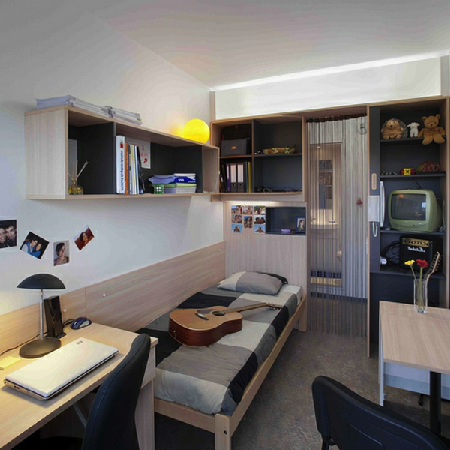Es gibt
Wiederholung (There is / There are)
Ask your partner whether certain things are in the room.
Remember that the thing in German that "is" or the things in German that "are" are in the accusative case,
because of the special idiom that in German says "It gives..." instead of "There is" or "There are". So,
- for neuter nouns, "Is there a bed in the bedroom?" is "Gibt es ein Bett in dem Schlafzimmer?"
- for feminine nouns, "Is there a lamp in the living room?" is "Gibt es eine Lampe in dem Wohnzimmer?"
- for masculine nouns, "Is there a table in the bedroom?" is "Gibt es einen Tisch in dem Schlafzimmer?"
- for plural nouns, "Are there two chairs in the living room?" is "Gibt es zwei Stühle in dem Wohnzimmer?"
Übung 3-8b: Was gibt es in dem Schlafzimmer? Identify objects in the rooms according to the pattern sentences
above.
 |
 |
das Schlafzimmer | das Wohnzimmer |
| Was gibt es in dem Schlafzimmer? | Was gibt es in dem Wohnzimmer? |
Übung 3-8c: Wortschatz zum Aussprechen. Essen und Trinken. Vocabulary and pronunciation exercise. Record your voice using the recording tool in BOLT.
No other format will be accepted. Practice before recording.
Essen: Directions.
- You will hear the words and phrases listed below.
- Repeat after the speaker and record yourself.
- Play back and listen to your voice, noting words that need more practice.
- Then record yourself reading aloud the text below the vocabulary list.
- Submit the sound file to the appropriate folder on BOLT under "Assignments".
- The grade for this exercise and for the similar exercise on "Seite 9" count together for 15% of the chapter test.
- Here is the recording: ESSEN
(Note: this recording uses the common alternate spelling of "gern". Both "gern" and "gerne" are
correct.)
-
- Was isst du gerne? -- What do you like to eat?
- Ich esse gerne Reis. -- I like to eat rice.
- das Lieblingsessen -- favorite food
- Mein Lieblingsessen ist Pizza. -- My favorite food is pizza.
- Ich bin Vegetarier. -- I'm a vegetarian.
- Isst du Fleisch? -- Do you eat meat?
- Ich esse kein Schweinefleisch. -- I don't eat pork.
- Trinkst du Alkohol? -- Do you drink alcohol?
- Nein, ich trinke keinen Alkohol. -- No, I don't drink alcohol.
- Ja, ich trinke Alkohol. -- Yes, I drink alcohol.
- Das ist süß. -- It's sweet.
- Das ist salzig. -- It's salty.
- Das ist sauer. -- It's sour.
- Schmeckt es dir? -- Does it taste good?
- Ja, sehr gut! -- Yes, very good.
- Das ist lecker. -- It's delicious.
- Nein, das schmeckt mir nicht! -- No, that doesn't taste good.
- Das schmeckt bitter. -- It tastes bitter.
- The first graded section (speaking) for the chapter test: Review and practice the text below, using Natural Readers.
Read aloud and record this text using the recording tool on BOLT, then post the audio file on BOLT under "Assignments" and "test 3 speaking".
Was isst du gerne, Nora? Ich esse Reis nicht gerne. Mein Lieblingsessen* ist Pizza.
Ich bin kein Vegetarier, aber** ich esse kein Schweinefleisch. Der Kuchen hier ist süß und lecker.
Aber der Kuchen hat Alkohol drin*** und ich trinke keinen Alkohol.
Wie schmeckt dein Sauerbraten? Ich finde ihn sauer und zu salzig.
*Lieblings...: any noun with the prefix "Lieblings-" expresses a favorite thing, such as
Lieblingsfarbe (favorite color), Lieblingsroman (favorite novel), etc.
**aber = "but, however"
***drin = "in it"
|













